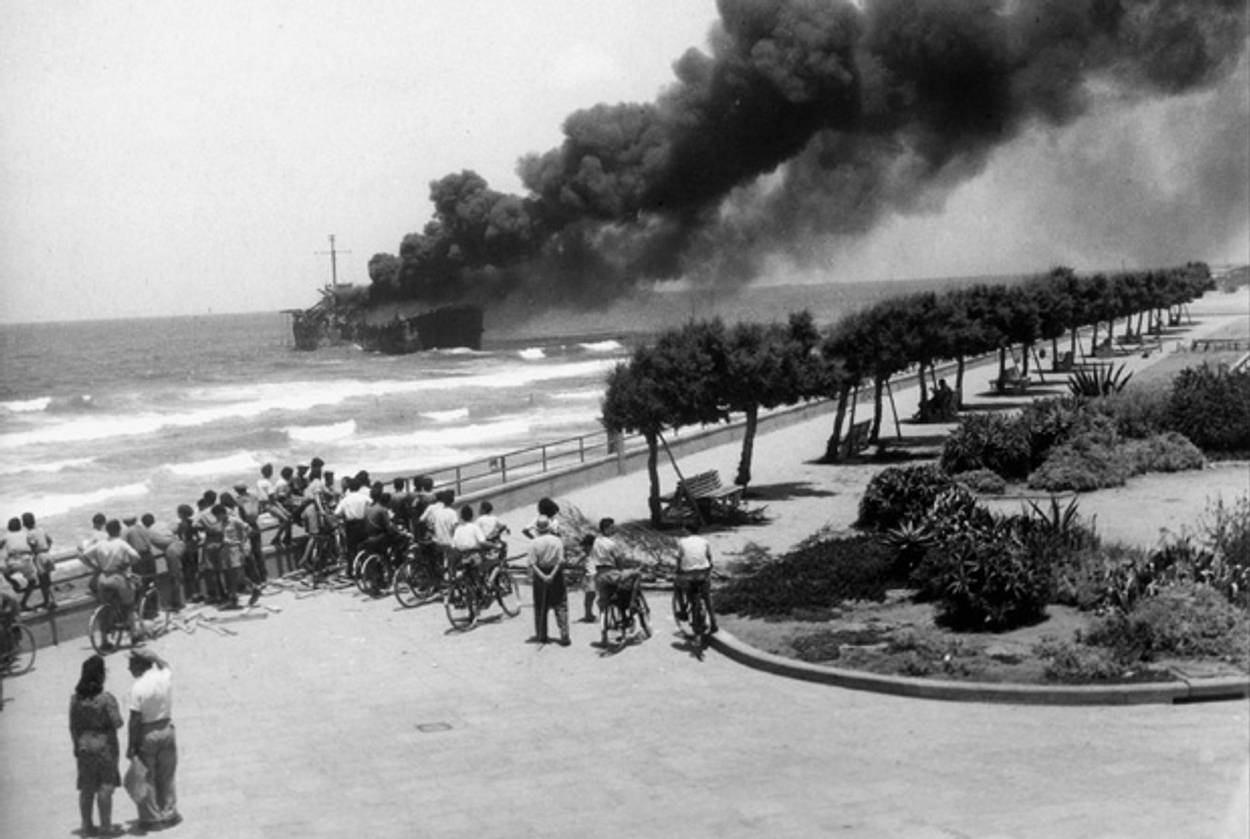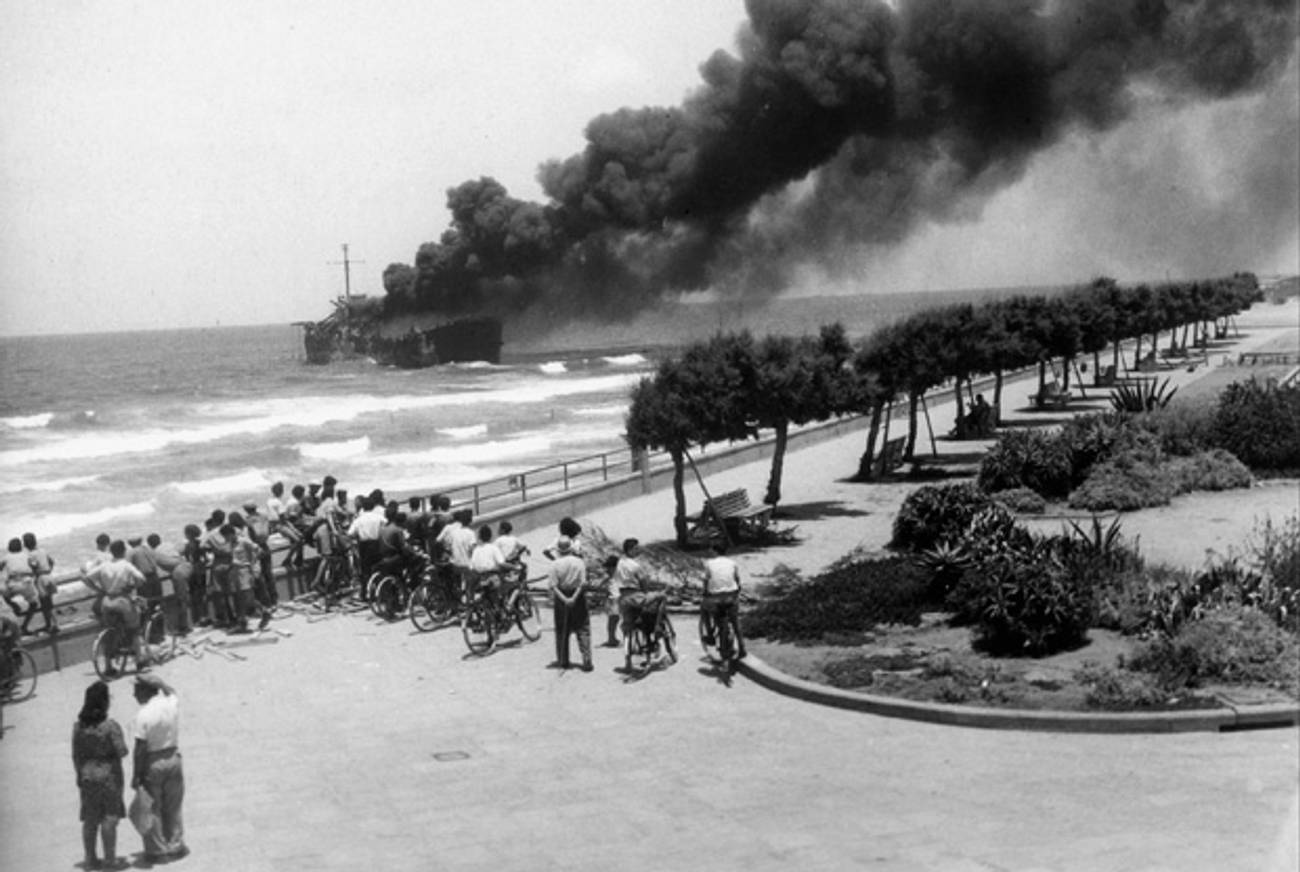Uncivil
As Israel fought for independence, David Ben-Gurion turned the military’s guns on Jews. In his new biography, Shimon Peres recalls his mentor’s greatest test.




For Israel, sorely pressed on every front, a four-week truce arranged by the U.N. Security Council, which finally went into effect on June 11, 1948, was a godsend. “I asked the members of the General Staff whether a truce would be to our advantage,” Ben-Gurion wrote in his diary on May 26. “All of them agreed that it would.” The period of quiet was spent rearming and training. It was a reinvigorated IDF that took to the field when the battle was rejoined on July 8. This was the case in more than just the logistical sense. For while the Arab guns had been silent, Ben-Gurion faced his sternest test—from within his own side.
The Provisional Government had issued an ordinance on May 26 establishing the Israel Defense Forces and prohibiting “the establishment or maintenance of any other armed force.” On June 1, Menachem Begin, the Etzel (also known as the Irgun) leader, signed an agreement with the government whereby Etzel units would join the IDF in battalion formations and take an oath of loyalty. The Etzel’s separate command structure would be disbanded within a month, and the organization would cease buying arms abroad.
Nevertheless, on June 11, the Altalena, a ship that the Etzel had purchased, set sail from southern France with a large quantity of arms and explosives on board as well as some 850 immigrants. As it approached the shores of Israel, Begin informed the government that 20 percent of the arms would be sent to Etzel units in Jerusalem. Since Jerusalem was not yet formally under Israel’s jurisdiction, Yisraeli Galili, negotiating for the IDF, agreed. Begin then proposed that the remaining weaponry go first to equip Etzel units within the IDF. Whatever was left could then be allocated to other units. Galili balked. He reported to Ben-Gurion on June 19 that the danger of a “private army” was evolving. Ben-Gurion convened the cabinet. “There are not going to be two states,” he declared, “and there are not going to be two armies. And Mr. Begin will not do what he feels like. … If he does not give in we shall open fire!” The cabinet resolved unanimously to “authorize the defense minister to take action in accordance with the law of the land.”
Ben-Gurion feared that Begin might use the arms aboard the Altalena to equip Etzel units outside the sovereign jurisdiction of the state—thus ostensibly not violating his commitment—in order to extend the war with the Arabs into the West Bank (Judea and Samaria), thereby defying government policy.
The Altalena anchored off Kfar Vitkin, a moshav, or settlement, between Tel Aviv and Haifa, and hopefully far from the prying eyes of U.N. observers, and began off-loading the weapons with the help of hundreds of supporters who had gathered at the site. Galili and Yigael Yadin, chief of operations for the IDF, deployed troops to surround the beach and ordered Begin to surrender. Some of the troops with Etzel sympathies crossed the lines and lined up with the Altalena crew and its enthusiastic sympathizers. The ship, with Begin and other Revisionist leaders now on board, weighed anchor and put out to sea, chased by IDF craft. It sailed south toward Tel Aviv and eventually ran aground close to the shore. At army headquarters in Ramat Gan, I spent that night with a rifle in my hand in Ben-Gurion’s office, in case the headquarters compound was stormed by demonstrators.
Off the Tel Aviv boardwalk, a traumatic scenario unfolded the next day. Etzel soldiers and civilian sympathizers streamed to the site. Some waded into the sea and swam out to the ship. At military headquarters, Ben-Gurion paced back and forth, fuming. Eventually he issued written orders to Yadin to concentrate “troops, fire-power, flame-throwers, and all the other means at our disposal in order to secure the ship’s unconditional surrender.” Yadin was then to await the government’s instructions.
Ben-Gurion then convened the cabinet again. Some colleagues suggested possible compromises, but he was of no mind for any such weakness. “This is an attempt to destroy the army,” he thundered. “This is an attempt to murder the state. In these two matters there can be no compromise.” The cabinet backed him. Small-arms fire broke out between shore and ship. The government evacuated homes and shops in the line of fire. The Palmach commander Yigal Allon, now a senior IDF general, was put in charge of the operation. He ordered a cannon deployed. Yitzhak Rabin was in command of it. The first shell fell wide, but the second struck the vessel. Fire broke out in the hold. Those on board began to abandon ship. (It stood barely one hundred yards from the beach.) But before they could all do so, an explosion tore through the ship, destroying it. Sixteen Etzel men and three IDF soldiers died in the episode; dozens more were wounded.
Begin delivered a two-hour broadcast live on Etzel radio that night, roundly cursing Ben-Gurion who, he claimed, had been out to kill him. For his part, Begin said, he would continue to restrain his men and thus prevent the outbreak of civil war: “We will not open fire. There will be no fraternal strife when the enemy is at the gate.” Ben-Gurion spoke at the People’s Assembly, the transitional parliament. He said that since the arms had not been destined for the IDF, he was glad they had been destroyed. He added a line praising “the blessed cannon” that had fired at the Altalena—a phrase the Revisionist stalwarts never forgot nor forgave.
Excerpted from Ben-Gurion: A Political Life by Shimon Peres in conversation with David Landau. The book, published as part of the Jewish Encounters series from Nextbook Press and Schocken Books, is out this week.
Shimon Peres has been president of the State of Israel since 2007. He also served two terms each as prime minister and foreign minister. One of the architects of the Oslo Accords, he was awarded the Nobel Peace Prize in 1994. David Landau was editor-in-chief of Haaretz from 2004–2008. Before joining Haaretz, he was diplomatic correspondent for the Jerusalem Post and its managing editor. He currently writes for The Economist.
Shimon Peres has been president of the State of Israel since 2007. He also served two terms each as prime minister and foreign minister. One of the architects of the Oslo Accords, he was awarded the Nobel Peace Prize in 1994. David Landau was editor-in-chief of Haaretz from 2004–2008. Before joining Haaretz, he was diplomatic correspondent for the Jerusalem Post and its managing editor. He currently writes for The Economist.